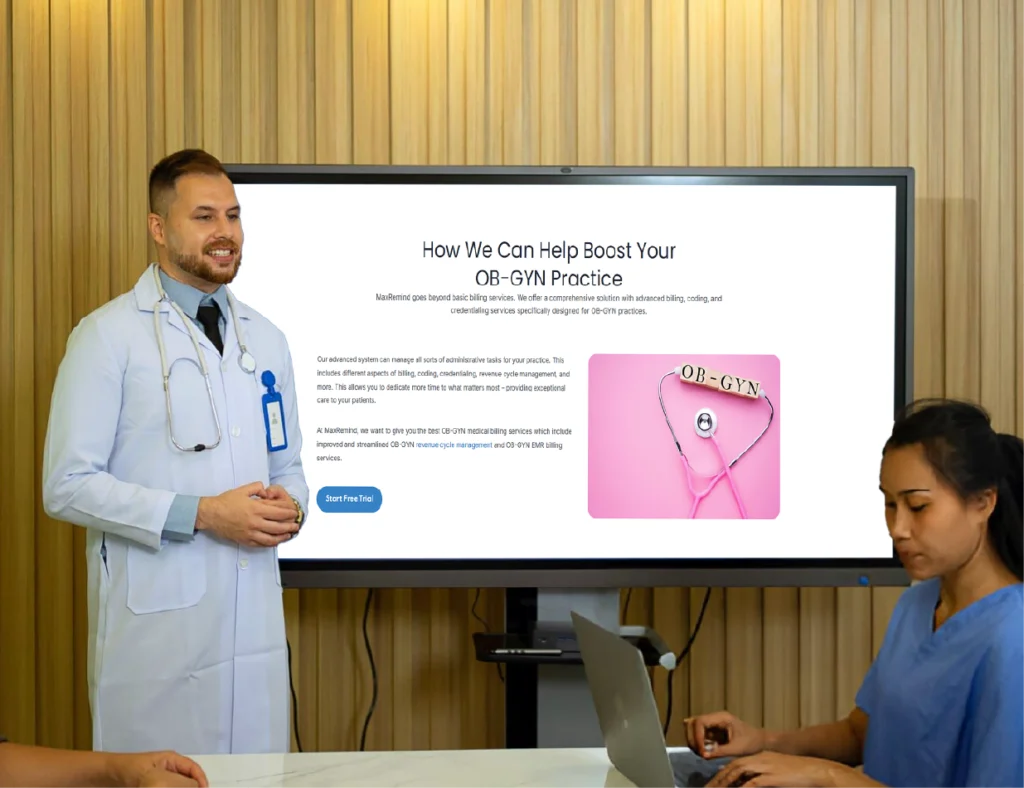
OB/GYN Global Package Billing Explained with Examples
Understanding OB/GYN global package billing is essential for protecting revenue and keeping a practice financially stable. In this blog, we’ll break down the inclusions, exclusions, common coding examples, challenges, and best practices. Finally, we’ll also discuss how specialized billing services like MaxRemind can help practices manage these complexities with ease.
What is OB/GYN Global Package Billing?
The intent behind global billing is to simplify reimbursement for insurers. Instead of processing dozens of separate claims, they process one comprehensive payment. However, this simplification for payers translates into added complexity for providers. Practices must track every single service, determine whether it falls under the global package, and submit claims correctly.

What Services Are Included in the OB Global Package?
- Routine prenatal visits:Scheduled check-ups to monitor the mother’s health and the baby’s development.
- Delivery services: Either vaginal or cesarean delivery, without complications.
- Immediate postpartum care: Office visits up to 6 weeks after delivery to monitor recovery.
- 59400 – Routine obstetric care, including vaginal delivery and postpartum care.
- 59510 – Routine care, including cesarean delivery and postpartum care.
- 59610 – Routine care including VBAC (Vaginal Birth After Cesarean).
What Services Are Excluded?
- Diagnostic procedures
such as ultrasounds, fetal non-stress tests, or lab work. - High-risk interventions
like amniocentesis, external cephalic version, or fetal monitoring. - Surgical procedures beyond routine delivery
such as repairing complex lacerations or managing delivery-related complications. - Hospital visits unrelated to pregnancy
such as urinary tract infections, hypertension unrelated to pregnancy, or chronic conditions. - Postpartum care beyond the 6-week window
for instance, a visit for postpartum depression at 3 months is billable separately.
OB/GYN Global Package Billing Examples
Example 1: Normal Vaginal Delivery
- All these services are billed under CPT 59400. The provider receives one bundled payment for the entire episode of care.
Example 2: Cesarean Delivery with Complications
A patient delivers via cesarean section. A week later, she develops an infection that requires an additional surgical procedure.
- Initial care billed under CPT 59510.
- The follow-up surgery is billed separately because it falls outside the global package.
Example 3: Postpartum Visit Beyond Global Period
- Since the 6-week global postpartum period has passed, this visit is not bundled.
- It is billed separately using an appropriate E/M CPT code such as 99214.
Common Challenges in OB/GYN Global Billing
- Payer-specific variations: Not all insurers interpret global package rules the same way, leading to confusion.
- Documentation gaps: If a provider doesn’t clearly document why a service is unrelated to pregnancy, it may be denied as bundled.
- Overlapping services: When multiple providers are involved in patient care, determining who bills for what becomes tricky.
- High denial rates: Miscoding or failing to separate excluded services often results in denied claims.

How to Avoid Revenue Loss in OB/GYN Global Billing
- Stay updated on payer rules: Regularly review payer guidelines, as Medicaid, Medicare, and commercial insurers can all differ in their interpretations of inclusions and exclusions.
- Document with precision: Providers must record the reason for every service and ensure it’s tied to the correct diagnosis.
- Use specialized billing software: Technology can reduce errors by flagging coding mismatches, automating claim submissions, and tracking bundled vs. non-bundled services.
- Conduct routine audits: Regular internal reviews help catch errors before claims are submitted and reduce revenue leakage.
- Consider outsourcing: Partnering with a billing expert ensures accuracy, faster reimbursements, and fewer administrative burdens for providers.
READ HERE: 7 Revenue Cycle Management Mistakes

MaxRemind’s Expertise in OB/GYN Billing
At MaxRemind, we recognize that OB/GYN global package billing requires more than just general medical billing knowledge; it requires specialized expertise. Our billing team is trained to handle the nuances of maternity care, ensuring every inclusion and exclusion is billed correctly.
- Accurate coding for both routine and complex OB/GYN services.
- End-to-end revenue cycle management, from charge entry to denial resolution.
- AI-driven tools to track global package rules and ensure compliance.
- Tailored solutions that adapt to payer-specific variations.
- Faster reimbursements so providers can focus on patient care instead of paperwork.

By partnering with MaxRemind, OB/GYN practices can significantly reduce denials, improve cash flow, and maintain compliance with payer rules.
Conclusion
Ready To Improve Your OB/GYN practice Revenue Cycle?
- What does the OB/GYN global package usually include?
-
The global maternity package typically includes routine prenatal visits, delivery (vaginal or cesarean without complications), and immediate postpartum care up to six weeks after delivery. All of these services are billed under a single CPT code, such as 59400 for routine vaginal delivery with postpartum care.
- What services are excluded from the global maternity package?
-
Services like ultrasounds, lab tests, high-risk interventions (e.g., amniocentesis), postpartum care beyond six weeks, and visits unrelated to pregnancy are excluded. These need to be billed separately with proper documentation to ensure reimbursement.
- Why do different payers have different rules for global OB billing?
-
While CPT codes provide standardized guidelines, insurance payers such as Medicaid, Medicare, and commercial insurers often apply their own interpretations. This variation requires practices to be payer-specific in their billing to avoid denials.
- How can providers avoid claim denials in OB/GYN global billing?
-
Providers can reduce denials by documenting every service accurately, staying updated on payer-specific rules, separating bundled and non-bundled services correctly, and conducting regular billing audits. Using specialized billing software or outsourcing to experts like MaxRemind also helps ensure compliance.
- How does MaxRemind help with OB/GYN global package billing?
-
MaxRemind offers specialty-focused billing solutions, accurate CPT coding, AI-powered claim tracking, and payer-specific compliance checks. By partnering with MaxRemind, practices can minimize errors, reduce denials, and secure faster reimbursements while focusing more on patient care.
